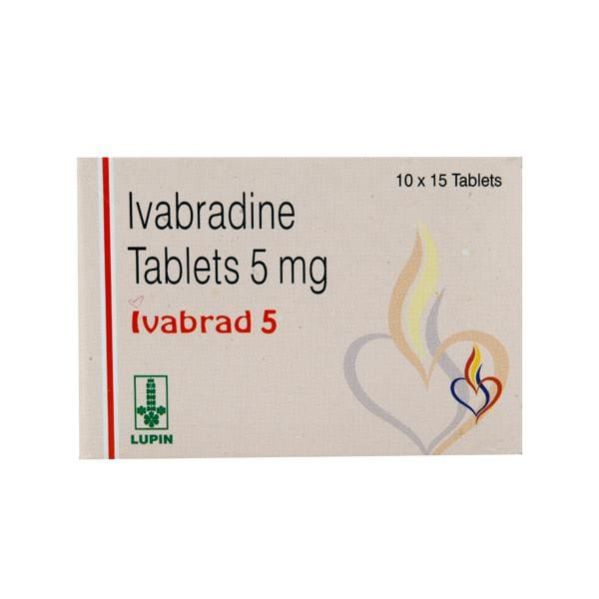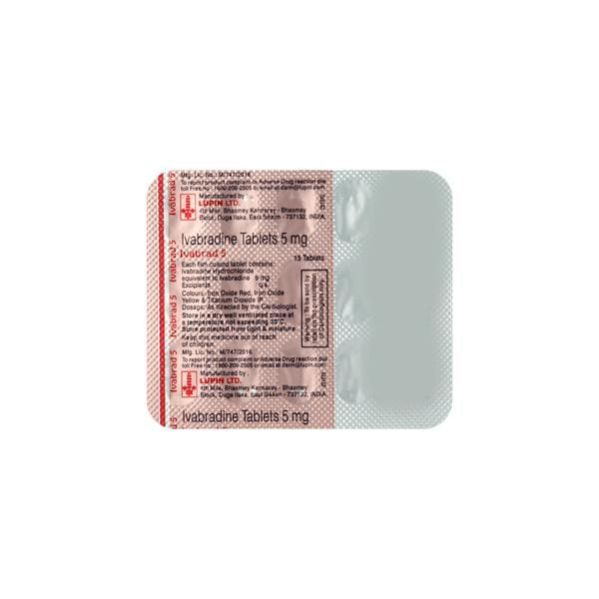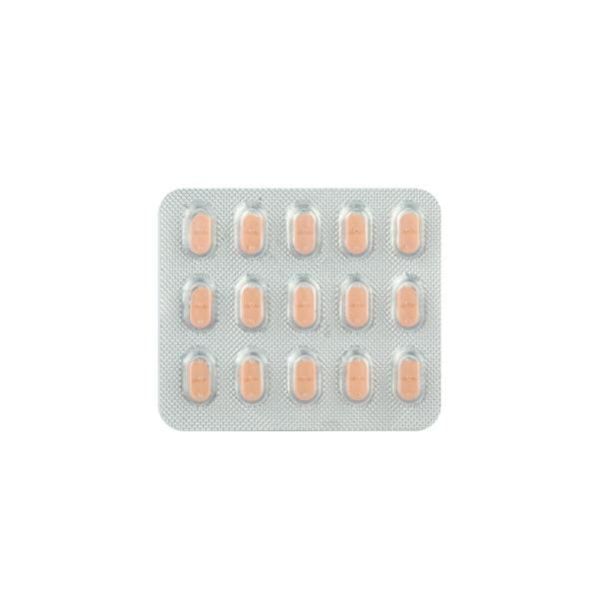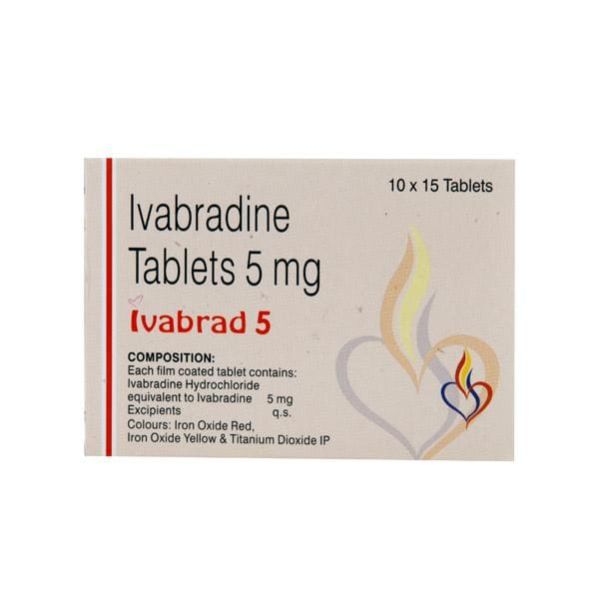Ivabrad 5 mg Tablet 15'S
IVABRADINE 5MG
₹ 368.00
₹409
(Inclusive of all taxes)
-

No Warranty
-

COD Avilable
-

Non Returnable
-

cancelable
About this item
INTRODUCTION ABOUT IVABRAD 5MG TABLET
Ivabrad 5 Tablet is used to manage symptomatic stable angina pectoris (chest pain) in adult patients who are intolerant/incapable to take heart medicines (such as beta blockers) and whose heart rate is over/equal to 70 beats per minute.
It is also used to manage chronic heart failure in adult patients whose heart rate is over/equal to 75 beats per minute, which are used as a combination therapy with beta-blockers, or in adult patients who are contraindicated to use beta-blockers.
It contains a medicine called Ivabradine, which belongs to the group of medicines called Hyperpolarization-activated cyclic nucleotide-gated channel blockers. It works by slowing down your heart rate, which reduces the heart’s need for oxygen. This helps improve blood flow and reduces chest pain or strain on the heart.
Ivabrad is not recommended for use in patients allergic to ivabradine. It is also not recommended for use in patients suffering from very low blood pressure, heart problems (such as unstable angina, cardiogenic shock), severe kidney disease, and/or severe liver disease.
Before taking Ivabrad, inform your doctor if you have mild to moderate low blood pressure, chronic eye retinal disease, recent stroke (cerebral attack), heart rhythm disorders (such as irregular heartbeat, palpitation, increase in chest pain), and/or moderate liver disease.
Ivabrad is generally not recommended for use in pregnant and breastfeeding women, in children, or in adolescents (aged below 18 years). Elderly patients (aged above 65 years) should use this medicine with caution after consulting their doctor.
The most common side effects of taking Ivabrad are brief moments of increased brightness (due to sudden changes in light intensity), slow heart rate, uncontrolled blood pressure, headache, dizziness, and/or blurred vision. Consult your doctor if any of these symptoms worsen.
HOW IVABRAD 5MG TABLET WORKS
Ivabrad Tablet works by reducing the heart rate, which leads to a low oxygen requirement of the heart, resulting in improved blood supply throughout the body (with each heartbeat), thus providing relief from angina pectoris and managing the occurrence of chronic heart failure in affected individuals.
DIRECTIONS FOR USE
- Take Ivabrad Tablet as advised by your physician.
- For Tablet: Swallow the medicines with a glass of water. Do not crush or chew the medicine.
- For Orally Disintegrating Tablet: Place Ivabrad Tablet inside your mouth and allow it to dissolve completely.
- Do not swallow or chew the medicine.
- Your physician will decide the correct dose and duration for you depending on your age, body weight, and disease condition.
SIDE EFFECTS OF IVABRAD 5MG TABLET
COMMON
- brief moments of increased brightness (due to sudden changes in light intensity)
- slow heart rate
- signs of atrial fibrillation (irregular rapid contraction of the heart) such as chest pain, pounding heartbeat, and tiredness
- uncontrolled blood pressure
- headache, dizziness, blurred vision
WARNING & PRECAUTIONS
PREGNANCY
ContraindicatedIvabrad Tablet is not recommended for use during pregnancy or in women planning for pregnancy. Women of childbearing potential should use reliable contraceptive measures while taking Ivabrad Tablet.
BREASTFEEDING
ContraindicatedIvabrad Tablet is not recommended for use in breastfeeding women.
DRIVING AND USING MACHINES
ContraindicatedDo not drive or operate any machines after taking the Ivabrad Tablet since it may cause temporary blindness (due to sudden changes in light intensity), which may affect your ability to concentrate while driving or operating machines.
KIDNEY
Use with CautionIvabrad Tablet should be used with caution in patients with severe kidney disease.
LIVER
Consult your doctorIvabrad Tablet is not recommended for use in patients with severe liver disease. It should be used with caution in patients with moderate liver disease.
ALLERGY
ContraindicatedDo not take Ivabrad Tablet if you are allergic to ivabradine and/or any other ingredients of this medicine.
HEART DISEASE
Consult your doctorIvabrad Tablet is not recommended for use in patients with heart problems such as slow resting heart rate (beats below 70/minute), cardiogenic shock, heart rhythm disorders (such as sick sinus syndrome, sino-atrial block, heart block), heavy heart attack, and/or severe heart failure. It should be used with caution in patients with other heart rhythm disorders (such as irregular heartbeat, palpitation, and an increase in chest pain), sustained atrial fibrillation, long QT syndrome, slow heartbeat (associated with signs such as tiredness, dizziness, and shortness of breath), and/or bundle branch block (a type of severe heart failure).
USE IN PEDIATRICS
ContraindicatedIvabrad Tablet is generally not recommended for use in children and adolescents (aged below 18 years).
USE IN GERIATRICS
Use with CautionIvabrad 5 Tablet should be used with caution in elderly patients (aged above 65 years).
OTHERS
Ivabrad Tablet is not recommended for use if you:
- suffer from very low blood pressure
- have unstable angina (a severe form of chest pain)
Before taking Ivabrad Tablet, inform your doctor if you:
- had a recent stroke (cerebral attack)
- suffer from mild to moderate low blood pressure (after change in antihypertensive management)
- have chronic eye retinal disease
INTERACTIONS
A. Drug-drug interactions:
Before taking Ivabrad 5 Tablet, inform your doctor if you are taking any of the following medicine:
- medicines used to manage fungal infections (Ex. fluconazole, ketoconazole, itraconazole)
- rifampicin (medicine used to manage tuberculosis)
- barbiturates (medicines used for difficulty sleeping or epilepsy)
- phenytoin (used for epilepsy)
- hypericum perforatum/St. John’s Wort (herbal medicines used for depression)
- medicines used to manage heart rhythm disorders (Ex. quinidine, disopyramide, sotalol, ibutilide, amiodarone)
- bepridil (medicine used to manage angina pectoris)
- medicines to manage anxiety, schizophrenia, or other psychoses (Ex. pimozide, ziprasidone, sertindole)
- medicines used to manage malaria (Ex. mefloquine, halofantrine)
- intravenous erythromycin (medicine used to manage bacterial infections in different parts of the body)
- pentamidine (medicine used in the management of pneumocystis pneumonia, leishmaniasis, and trypanosomiasis)
- cisapride (used for acid reflux)
- diuretics (medicines used to manage oedema, high blood pressure) Ex. furosemide, hydrochlorothiazide, indapamide
- clarithromycin, josamycin, telithromycin, and erythromycin (medicines used for bacterial infections)
- nelfinavir, ritonavir (medicines used to manage HIV infections)
- nefazodone (medicine used to manage depression)
- diltiazem, verapamil (medicines used to manage high blood pressure/angina pectoris)
B. Drug-food interaction:
Avoid drinking grapefruit juice while taking Ivabrad Tablet, as it may alter the effect of the medicine.
Overdosage:
If you or anyone else accidentally takes too much of Ivabrad Tablet, consult your doctor immediately or visit the nearby hospital. Symptoms of overdose are breathlessness and tiredness.
SYNOPSIS
| Drug | : | Ivabradine |
| Pharmacological Category | : | Hyperpolarization-activated cyclic nucleotide-gated channel blockers |
| Therapeutic Indication | : | Symptomatic stable angina, Chronic Heart failure |
| Dosage Forms | : | Tablet |
0 Review Of Product Ivabrad 5 mg Tablet 15'S
















